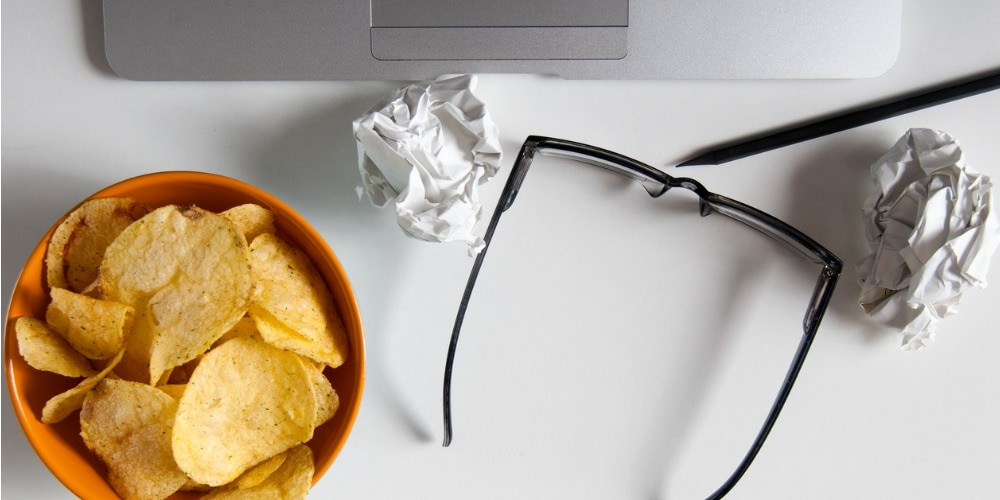
This is a guest post by Kayla Matthews. She is a productivity blogger and efficiency enthusiast. You can find her on ProductivityTheory.com, on The Huffington Post, and on Google+ and Twitter.
The joints of your fingers numb and tire, and your eyes feel adhered to the computer screen by some supernatural glue. You need to get up and stretch, go to the copier and the bathroom and check in on a report — but you’re stuck in your seat. Crunching numbers is more akin to watch the clock tick by. Is too much being asked of you? Are you asking too much of yourself?
While many businesses equate a hard work ethic with working until you drop, another factor strongly influences your relationship with getting the job done. Being overweight is increasingly linked to a decrease in productivity at work, but overweight employees unfairly get the full burden of blame.
More employers want to invest in employee health, but both employers and coworkers may be biased against what being overweight in the workplace means for employees with extra weight. A third of American population is considered overweight while full-time employees spend a third of their lives at work, and the disparity of what needs attention runs deep.
The Absent-Minded Presenteeism Association
Most of what employers and other employees see when an overweight or obese employee goes missing in action are the tip of the iceberg. It’s more than assumed laziness and perceived lack of competency.
Presenteeism is the loss of productivity in the workplace and its association with being overweight or obese — it’s becoming the new plague on workplace productivity, employee health and positive work culture as employers and employee struggle to make sense of what to do with the situation.
Overweight employees are more likely to miss work due to health concerns, yes, but a mix of genetics, adverse work environments, lack of work-life balance and other stressful factors contribute to the cause. These factors snowball until they become hidden burdens that lead to decreased productivity, worker compensation claims, absenteeism and even employee turnover due to ill health or death.
Weighing the Costs of Obesity, Productivity and Adverse Work Conditions
Obesity is linked to various chronic health conditions including cardiovascular disease, hypertension, type 2 diabetes, particular cancers (such as breast), anxiety, depression and premature mortality, among others.
Increasing research reveals adverse working conditions impact risk for obesity, such as stress-related eating. When you race the clock to catch up, you may misjudge when your body expresses true hunger and overeat to make up the difference. It’s common sense that stress levels will rise when under pressure from an overbearing boss or unhealthy work environment, especially if you’re lifting things you shouldn’t for too long, leading to a rise in work-related injuries and claims:
- In one study, the yearly rate of office-related injury was 4.3 for every 100 American workers among a fifth of women and a third of men.
- In one particular cost-analysis study, injury costs linkable to heavier patients among hospital employees ranged from -$200 to $1,724 for overweight participants and from $108 to $1,857 for obese patients. Productivity loss was not analyzed.
- Among 39 different studies compared sick leave days taken among normal weigh employees with those taken by overweight and obese employees: excess costs ranged between $54 to $161 for overweight and $89 to $1,586 for obese as annual expenses. Another study revealed higher costs for normal weight employees than those overweight, the highest annual costs were for those obese — excess costs not taken into account.
- In looking more closely at presenteeism in the workplace, employer surveys assessed loss ranging from -$611 to $1669 for overweight employees and $11 to $4,175. One study revealed higher loss for normal weight than overweight employees.
- Among lifetime productivity lost, one study assessed $18,064 lost per overweight patient utilizing the HCA.
- One Duke University study found that obese workers file 2:1 as many claims as healthy workers.
- Obese folks spend 42 percent more on healthcare, and when they must take off, such workers are likely to need more recovery time.
Clearly there are disparities between the instances of sick leave and costs of productivity loss due to weight, leading to a link between obesity and discrimination. Being overweight can affect one’s productivity and health, but the negative assumptions and attitudes of coworkers and employees also influence the case. This includes the stress of trying to be productive in unhealthy work environments while facing weight-related health concerns.
Employers who confine their employees to desks all day and add to poor work-life balance contribute also to the indirect and direct costs of obesity in the workplace. Employers and employees must stop indulging in myths related to obesity. Psychological distress and chronic health conditions persist in the workplace as a result, perpetuating a cycle and increased likelihood of obesity in the office.
What Employees Think Contribute to the Problem
Over half of American workers believe they’re overweight as told by a recent CareerBuilder survey that analyzed what employees had to say about personal weight gain in the workplace. Breaking that down, 56 percent of all U.S. workers think they’re overweight and another 45 percent believe they’ve gained extra pounds.
Of those surveyed, one in ten had gained over twenty pounds at their existing job. Here’s what employees believed contributed to their weight gain — in increasing order:
- Happy hour (4 percent)
- Pressure to consume food coworkers brought in (8 percent)
- Office candy jar temptations (16 percent)
- Celebrations at work (18 percent)
- Skipping meals due to time constraints (19 percent)
- Regular dining out (24 percent)
- No time to exercise, before or after working (38 percent)
- Stress eating (38 percent)
- Work exhaustion prevents exercise (45 percent)
- Remaining seated at a desk for most of the workday (51 percent)
Employees are crunched for time — literally. Their mental, emotional and physical health suffers, and the battle against workplace obesity runs deeper than trying to make a few obese employees lose weight through “polite” coercion disguised as fitness at work programs. Many employers are earnest in their desire to do their part in cultivating a work-life balance for employee health, but negative habits and adverse conditions contribute to the cause.
What can be done? Employers do their best to offer massages, invite fitness instructors, create meditations and bring plants indoors to cultivate a healthy and productive environment, but there never seems to be enough time, motivation or real change in the status quo of workplace culture to make it happen. Employees, who often get the brunt of the presenteeism blame, are left to try their best — it’s time to take a closer look at what that can mean.
How Employees Can Boost Productivity

But it’s so tiring! Isn’t everyone tired? Doesn’t everyone face work-life balance challenges?
Yes, but that’s a generalized conversation derailing the real conversations employers and employees need to be having right now. Such an attitude leads to the nuances that contribute to the growing situation of workplace obesity.
Employees must task themselves with hacking healthy practices in the workplace and encouraging employers to do their due. Here are a few tips to boost your productivity at work while employers catch up with best practices and programs related to obesity discrimination, whole health and obesity in the workplace.
1. Practice Mindful Breathing
You know the term “fight or flight” which refers to your stress response. Your health is adversely affected when deadlines and woes place your system under repeated decision-making between these responses.
The stress response tries to cope but can’t when under too many pressures, such as repressing your immune system. A bad body image influences shallow breathing, which leads to inadequate breath for your lower lungs and limits your diaphragm’s range of motion. This contributes to feeling short of breath and affects your health. You need to breathe mindfully from your full abdomen and stomach.
Practicing a relaxing response like mindful breathing helps regulate your heart health and keep your fight or flight responses in check. Start by lying down and breathing in fully through your nose, inflating your abdomen and releasing slowly through your nose — don’t strain. Do what feels natural to you. Over time, you can practice more controlled meditative breathing patterns.
2. Break Up Meals Into Five
Before you realize it, most of the day passed you by without you taking lunch or eating dinner. When you do eat, you feel ravenous and binge eat.
Eat a healthier and balanced meal by staggering your meals throughout the day, splitting up the typical three meals a day into five smaller meals by a few hours. Keep healthy and handy small plate items nearby, such as nuts, cheese, fruit and veggies. Nuts, berries and cauliflower are examples of brain-friendly and healthy for your body, helping to keep you focused.
If counting calories, breaking up meals into five smaller ones may make the process easier to track. Set an alarm on your phone or work computer to establish a steady routine.
3. Take a Personal Sanity Day
Remember, full-time workers spend a third of their life working, but you probably work more than you think. Nearly half of all workers don’t take vacation, letting time accumulate and go to waste, affecting long-term health. Don’t work yourself until you burnout or get injured.
You don’t have to take a full vacation. Sometimes, all you need is a half day or a full day to rebalance. Put the request in and take a personal sanity day. Get out in nature. Visit family and friends. Explore yourself and your surroundings to relieve stress and boost your health and productivity.
4. Alternate Standing and Sitting
Sitting has been deemed “the new smoking.” Your brain could resemble someone with dementia if you sit for too long, including raising risk for heart disease, diabetes, obesity, blot clots and mortality. Ask your boss to invest in a convertible sitting/standing desk or alternate between standing and sitting at least twice on the hour to keep your body relaxed and healthy.
5. Get Back to Nature

Staring at the same four walls day in and day out gets old, and adverse work environments and demands increase your stress levels. Humans were meant to see green beyond motivational posters in their daily life.
Get back to nature, even if it’s five minutes admiring the pansies at the coffee shop next door. Park a little farther away from work and make a walk part of your commute. Take time to stop at a nearby park and spend a minute mindfully breathing.
Research reveals short-term memory improves by 20 percent when you walk among the trees, and inflammation lowers more in nature than when surrounded by concrete when taking a stroll. Other benefits included decreased stress, improved creative thinking and possible cancer prevention.
6. Make Working Out Right For You
You tried the whole gym thing, but it’s not for you. Don’t give up.
If you like nature, start with a twice-weekly walk in a park or greenway of your choice. Many people who feel less than agile are more graceful with water sports or swimming. Why not join a community basketball team?
If you love music, give social dancing a try. Similar to a runner’s high, social dancing releases endorphins in the brain, and it also improves balance and coordination while helping with weight loss. Your mood will lift, and your whole body will love it. Plus, you get to make new friends while trying swing, blues, salsa and other forms of dance.
7. Deskerercise
Whether facing work demands or other obstacles, you don’t have time to get to the gym or even walk around for five minutes. Break time is used for other important tasks in life, such as catching up on personal calls.
So, get flexible at your desk with “deskercises” to beat the funk that affects eight out of ten workers as desk potatoes. These stretches only take a few seconds to minutes to complete, such reaching over your head and giving each arm a hold and stretch. Another instructs you to cross your legs and flex your torso to get all the kinks out. It’s amazing how many exercises you can do at your desk, using the chair and the desk itself.
8. Ask for More Time
You don’t plan to take time beyond deadlines to get everything done, but it happens — before you know it, you’re stressed and so is your employer. You have to work at a healthy pace for yourself, and that’s not your fault.
Don’t let bad impressions or negative assumptions add up. Talk to your employer about feeling overwhelmed, and ask more for time to complete work.
9. Flex Time
Workout at the office before, after or during with employer permission. Here are a few ideas to approach flex time at work.
Does your employer have a gym onsite or workout opportunities for employers? If a room is collecting boxes and dust, pitch your employer a viable idea for employee health and positive work culture: Transforming a spare room at the office into small gym or workout class space benefits all.
Plus, you can stream productivity memes to help everyone focus when YouTube yoga videos growing boring. A little humor or an inspiring quote goes a long way to a positive mindset.
Have such programs already in place? Have access to a gym nearby via employer-sponsored membership? Now’s the chance to make a fitness field trip. If there’s a time during the day that you need a pick-me-up, consider asking your employer for flex time to work out and work extra in the morning, evening or at home to get everything done.
10. Practice Yoga in Bed

Yes, you can practice yoga in bed. It’s a wonderful way to wake up in the morning and ease yourself into sleep. It’s also beneficial when going through the recovery process and when you need to improve flexibility.
You can do at least eleven poses while in bed, such as the butterfly pose — sit with bent knees and the soles of your feet together. Keep your back straight as possible and lean forward over your legs. This poses stretches your back and hips. Other poses stretch other parts of the body and have fun names, such as the pigeon and cobra.
Keep doing your best — it’s all you can ask of yourself. Many individuals think of doing their best as achieving their ultimate potential on a day-to-day basis, but that’s not reality in this busy 9-to-5 grind life. Define your best.
Define it in a moment to moment basis, and push just 1 percent harder each time. Where there’s a will, there’s a way—even if that means doing yoga in bed or spacing out your meals.
Who knows? You might be a part of establishing better workplace policies as a result of speaking out or pitching new practices, such as using a spare room as a gym or meditation space. Take up the challenge do your version of best and encourage employers to do the same.
A Call to Address Presenteeism in Healthier Ways
Both employers and employees suffer from presenteeism in the workplace. Business and employee success are at stake. Overweight and obese employees are at a real risk for chronic health diseases and disorders.
Opening a window can only do so much — one most go outside for a refreshing change of perspective and improved health and productivity.
The brunt of the blame should not fall on overweight employees, but it unfortunately does. While being overweight does affect productivity at work, there’s more underneath the surface to consider and address.
This is a guest post by Kayla Matthews. She is a productivity blogger and efficiency enthusiast. You can find her on ProductivityTheory.com, on The Huffington Post, and on Google+ and Twitter.

Awesome, Thanks for contributing your important time to post such an interesting & useful collection of knowledgeable resources that are always of great need to everyone. I visit this blog first time and encourage by this good stuff work. Unbelievable post keeps up posting such great information. There are things here that I didn’t think some time as of late. am very enjoyed for this weblog. It’s an informative subject matter.